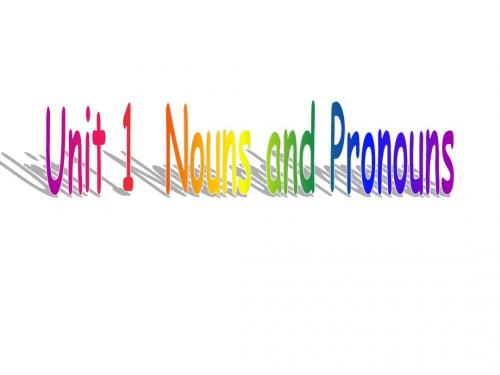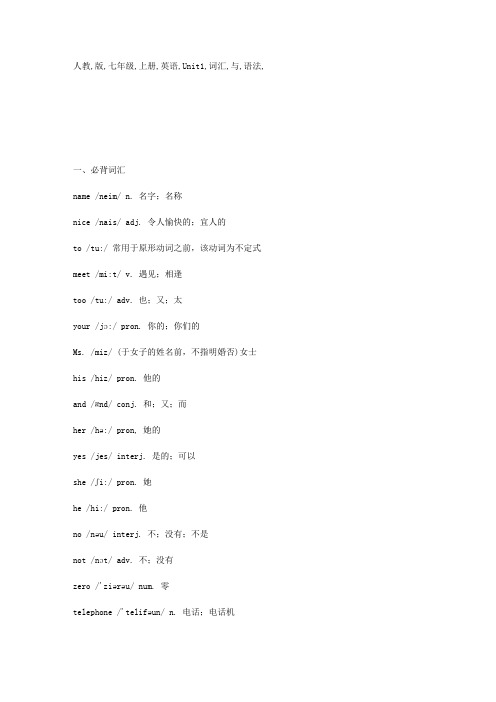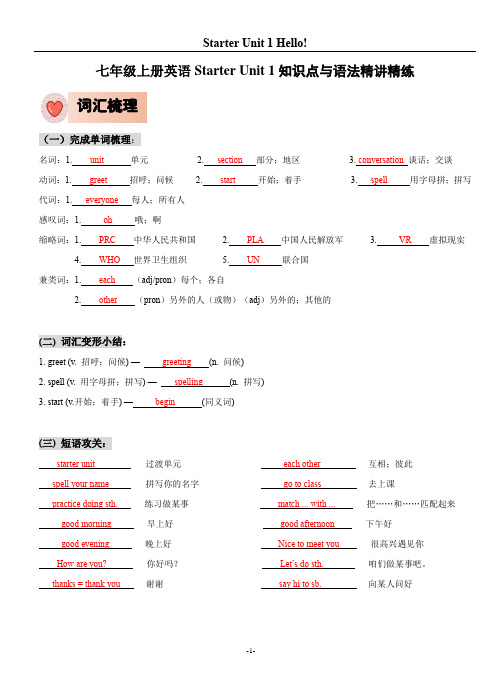Unit1名词和代词文字版
- 格式:pdf
- 大小:798.85 KB
- 文档页数:18

人教版八年级英语上册笔记1--10单元精心整理超详细!人教版八年级英语上册笔记1--10单元Unit 1 Where did you go on vacation ?Section A 知识提纲一、词形变化1.wonder v. 想知道→adj. wonderful 精彩的,绝妙的二、短语1.go on vacation去度假2.stay at home待在家里3.go to the mountains去爬山4.go to the beach去海滩5.visit museums 参观博物馆6.go to summer camp去参加夏令营7.quite a few相当多 8.study for tests为测验而学习9.go out出去 10.go out with anyone 跟别人出去11.most of the time大部分时间 12.of course=sure =certainly 当然13.have a good time doing=have fun doing =enjoy oneself 玩得高兴14.go shopping去购物 15. keep a diary 写日记三、词法1. buy sb. sth.=buy sth. for sb.为某人买某物Buy me some books = Buy some books for me .2.taste / look/sound/smell good. 尝起来/看起来/听起来/闻起来不错3.nothing…but+动词原形除了……之外什么都没有I have nothing to do but watch TV all day .我整天除了看电视什么也没干。
4.seem link v.(系动词) 似乎,好像,看来① seem + adj.② seem to do sth.③ It seems that + 陈述句5.Long time no see . 好久不见。

Unit1 Can you play the guitar?一.短语:play the guitar 弹吉他play the piano 弹钢琴play chess 下象棋play the drums 敲鼓speak English 说英语speak a little English 说一点英语say it in English 用英语说它join the art club 加入艺术俱乐部sports club 运动俱乐部join the swimming club加入游泳俱乐部what club 什么俱乐部what sports什么运动play the guitar well 弹吉他弹得好be good with sb和某人相处的好be good for···对······有益处be good at···擅长······help sb with sth / do sth帮助某人干某事help kids with swimming帮助孩子们游泳do Chinese kung fu表演中国功夫be in参加,加入call sb at + 电话号码给某人打电话拨打···号tell stories 讲故事have an e-mail address 有电子邮件的地址rock band 摇滚乐队a little 一点(后接不可数名词)talk about 谈论…. talk with/to sb 和某人交谈show sth to sb = show sb sth 把某物给某人看want to do sth 想做什么事after school 放学后play games with sb和某人玩游戏on the weekend 在周末make friends with sb 和某人交朋友二.课文知识讲解:1. Can you play the guitar? 你会弹吉他吗?(1)can 是情态动词。


人教,版,七年级,上册,英语,Unit1,词汇,与,语法,一、必背词汇name /neim/ n. 名字;名称nice /nais/ adj. 令人愉快的;宜人的to /tu:/ 常用于原形动词之前,该动词为不定式meet /mi:t/ v. 遇见;相逢too /tu:/ adv. 也;又;太your /jɔ:/ pron. 你的;你们的Ms. /miz/ (于女子的姓名前,不指明婚否)女士his /hiz/ pron. 他的an d /ænd/ conj. 和;又;而her /hə:/ pron, 她的yes /jes/ interj. 是的;可以she /ʃi:/ pron. 她he /hi:/ pron. 他no /nəu/ interj. 不;没有;不是not /nɔt/ adv. 不;没有zero /'ziərəu/ num. 零telephone /'telifəun/ n. 电话;电话机number /'nʌmbə/ n.号码;数字phone /fəun/ n. 电话;电话机telephone/phone number 电话号码first /fə:st/ adj.第一first name 名字last /la:st/ adj. 最后的;末尾的last name 姓friend /frend/ n. 朋友China /'tʃainə/ 中国middle /'midl/ adj. 中间的;中间school /sku:l/ n. 学校middle school 中学;初中二、重点词汇1. nice adjective /naɪs/1). pleasant, enjoyable, or satisfactory 愉快的;美好的;满意的例句:Did you have a nice trip? 你假期过得愉快吗?Have a nice day/time! 祝你度过愉快的一天/过得愉快!2). kind, friendly, or polite 好心的;友善的;有礼貌的例句:I wish you'd be nice to your brother. 我希望你会好好对待你弟弟。

七年级上册英语Starter Unit 1知识点与语法精讲精练词汇梳理(一)完成单词梳理:名词:1. unit单元 2. section 部分;地区 3. conversation 谈话;交谈动词:1. greet 招呼;问候 2. start 开始;着手 3. spell 用字母拼;拼写代词:1. everyone 每人;所有人感叹词:1. oh 哦;啊缩略词:1. PRC 中华人民共和国 2. PLA 中国人民解放军 3. VR 虚拟现实4. WHO 世界卫生组织5. UN 联合国兼类词:1. each (adj/pron)每个;各自2. other (pron)另外的人(或物)(adj)另外的;其他的(二) 词汇变形小结:1. greet (v. 招呼;问候) — greeting (n. 问候)2. spell (v. 用字母拼;拼写) — spelling (n. 拼写)3. start (v.开始;着手) — begin (同义词)(三) 短语攻关:starter unit 过渡单元each other 互相;彼此spell your name 拼写你的名字go to class 去上课practice doing sth. 练习做某事match ... with ... 把……和……匹配起来good morning 早上好good afternoon 下午好good evening 晚上好Nice to meet you 很高兴遇见你How are you? 你好吗?Let’s do sth. 咱们做某事吧。
thanks = thank you 谢谢say hi to sb. 向某人问好1. 26个英文字母【用法详解】1. 重点:英语中一共有26 个英文字母,其中包括 5 个元音字母(Aa 、Ee 、Ii 、Oo 、Uu )和21个辅音字母。
2.大写字母的基本用法:(1)句子的开头;Eg.I went to the store yesterday. 我昨天去商店了。

人教版(PEP)四年级英语下册Unit 1-6单元知识梳理(1)Unit 1 My school重点单词:first floor一楼second floor二楼playground 操场library 图书馆art room美术教室music room 音乐教室teachers’ office教师办公室computer room计算机教室homework家庭作业class班级forty四十习惯搭配及短语on the first/second floor 在一/二楼next to...紧邻;在…...旁边go to…去…...This way,please.这边请。
welcome to…欢迎来到…...how many多少Excuse me. 打扰了。
重点句型:☆1.--Where is the teachers’ office∕art room?教师办公室∕美术教室在哪里?--It’s on the first∕second floor. 它在一楼∕二楼。
☆2.--Is this∕that a teachers’ office? 这∕那是教师办公室吗?--Yes,it is. ∕No,it isn’t. 是的,它是。
∕不,它不是。
☆3.The teachers’ office is next to the library. 教师办公室挨着图书馆。
☆4.--Do you have a library? 你们(学校)有图书馆吗?--Yes, we do. ∕No,we don’t.语法点:特殊疑问句Where’s the+事物? ……在哪里?及其回答:It’s+表地点的介词短语。
它在……一般疑问句:--Do you have+某物?你/你们有……吗?肯定回答:--Yes,I/we do.否定回答:--No,I/we don’t.Is this∕that…? 这∕那是…?肯定回答:--Yes, it is.否定回答:No, it isn’t.Unit2 What time is it?重点词汇:breakfast 早餐lunch午餐dinner 晚餐go to bed 上床睡觉English class 英语课music class音乐课PE class体育课get up 起床go home 回家go to school 上学习惯搭配及短语:hurry up快点come on快;加油just a minute稍等一会儿Breakfast is ready.早餐准备好了。
八年级上册英语Unit 1知识点与语法精讲精练词汇梳理(一)完成单词梳理:名词:1. hen母鸡 2. pig 猪 3. diary 日记;记事簿4. activity 活动5. paragliding 滑翔伞运动6. bird 鸟7. bicycle 自行车8. building 建筑物;房子9. trader 商人10. difference 差别;差异11. top 顶部;表面12. umbrella 伞;雨伞13. hill 小山;山丘14. duck 鸭动词:1. seem 好像;似乎;看来 2. decide 决定;选定 3. wonder 想知道;琢磨4. wait 等待;等候代词:1. anyone 任何人 2. something 某事;某物 3. nothing 没有什么4. everyone 每人;人人;所有人5. myself 我自己;我本人6. yourself 你自己;您自己7. someone 某人副词:1. anywhere 在任何地方形容词:1. wonderful 精彩的;绝妙的 2. bored 厌倦的;烦闷的3. enjoyable 有乐趣的;令人愉快的4. wet 湿的;潮湿的5. hungry 饥饿的兼类词:1. few (adj/pron)不多;很少 2. most (adj/adv/pron)最多;大多数3. try (n/v)尝试;设法;努力4. below (prep/adv)在……下面5. enough (adj/adv)足够的(地)6. dislike (v/n)不喜爱(的事物)7. as (adv)像……一样(conj)当……时;如同(二) 词汇变形小结:1. wonder (v. 想知道) — wonderful (adj. 精彩的;绝妙的) — wonderfully (adv. 精彩地)2. bore (v. 使……厌烦) — bored (adj.厌倦的)— boring (adj.令人厌倦的)3. diary (n. 日记) — diaries (复数)4. enjoy (v. 喜爱) — enjoyable (adj. 有乐趣的;令人愉快的)5. activity (n. 活动) — activities (复数)6. decide (v. 决定) — decision (n. 决定)7. build (v. 建造) — building (n. 建筑物;房子)8.trade (n/v贸易;买卖) — trader (n. 商人)9. difference (n. 差别;差异) — different (adj. 不同的)10. wait(v. 等候;等待) — waiter (n. 男服务员) — waitress (n. 女服务员)11. like(v. 喜欢)— dislike 反义词(v.不喜欢)【练一练】用所给词的适当形式填空1.–Mom. I plan to wash clothes by ___myself____(I) this summer vacation.- Good girl! Go for it.2.Can you tell me some __differences___(different) between the two pictures?3.The students have quite a few activities (activity) after class. They can sing, dance and play basketball.4.I think it will be a very enjoyable (enjoy) trip for you to travel to Beijing.5.His cousin is a trader (trade), selling fruit and vegetables.6.The TV show is really boring (bore). I don’t want to watch it.7.As a teacher, Mr. Green always tries to make his lessons _enjoyable__(enjoy).8.This film is _wonderful___ (wonder). I like to see it very much.9.I can look after __myself____(my). Don’t worry about me.10.You must look after __yourself____(you) well while I'm away, Tom.(三) 短语攻关:go on vacation去度假stay at home 待在家里go out 出去quite a few 相当多;不少most of the time大部分时间of course当然have a good time=enjoy oneself 玩得高兴feel like 给……的感觉;感觉像take photos 拍照;照相keep a diary 写日记buy sth for sb 买某物给某人decide to do sth 决定做某事something important 重要的事find out 找出;查明in the past 在过去make a difference 产生影响;起作用enjoy doing sth喜欢做某事too many 太多arrive at/in 到达because of 因为;由于wait for 等待;等候start to do /doing sth开始做某事知识点梳理1.We took a few photos there.我们在那里拍了很多照片。
英语1(基础模块)第2版知识点及练习Unit One Nice to meet you !一、词汇(一),firstnum.第一(基数词one的序数词) ; n.第一,最初; 头等;adv.最初; 首先; at firstadj.第一流的; 最初的,最早的; 基本的;(二),lastn.末尾; 最后; 上个; vt. 经受住; 够用; 足够维持; vi.持续;adj.最近的; 最后的; 最不可能的; 惟一剩下的;adv.上一次,最近一次; 最后; at last(三),Mr. 先生,与Sir先生; Mrs. [misiz] 女士(已婚)Miss 小姐(未婚) Ms. [miz] 女士(婚姻状况不明)Madam 夫人,太太,小姐1. Mr. 意为"先生",Mr. 是Mister (先生)或Master (主人)的缩写。
一般用于男子姓氏或职务前;不管年龄大小;辈分长幼;职务高低;结婚与否,男子都可称为Mr.;后面跟姓。
如果一个男子的职务是校长,就可以称他为Mr.Headmaster (校长先生);Sir :对不相识的男子或上级;长辈或从事某种职务的男子表示尊称时,英;美人通常用sir,意为"先生;阁下;长官",后面不跟姓氏;如:—May I go now,sir?(先生,我可以走了吗?)—Yes,sir.(可以,先生;) sir还广泛用于各类信件中,如:Dear sir,Dear sirs;2. Mrs.意为"夫人,太太",是Mistress 的缩写。
常用于已婚妇女的丈夫的姓氏前;如果一个名叫Mary Jones的女子嫁给了一个名叫Jack White的男子,就称她为Mrs. White,但不能称Mrs. Jones;Mrs. Smith lives in Paris. 史密斯太太住在巴黎。
3. Miss意为"小姐",复数形式为Misses,用于对未婚女子的称呼;如果一个未婚女子名叫Rose Jones,可以称她为Miss Jones。